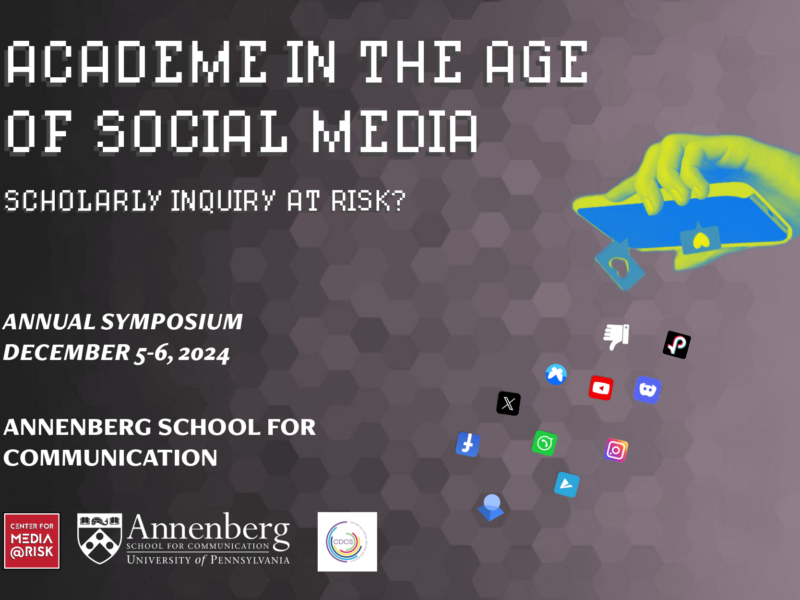For TikTok users, 2025 has been a rollercoaster. After legal battles, protests, and politicians flip-flopping their stance on the ban, TikTok went dark on the evening of January 18th, 2025, just hours before the January 19th deadline that ordered its shutdown. Albeit for less than a day. For several weeks, the app could no longer be downloaded on Google Play or Apple’s App Store, but platform functionality remained (and with a gleeful message thanking US President DonaldTrump). Now, nearly a month later, Apple and Google have brought the app back to their stores.
While the app’s future is still unclear—on his first day in office, Trump issued a 75-day extension on the ban—US TikTok users are back on the platform in full force, releasing and viewing a steady stream of content. Reactions to the unpredictably enforced ban are revelatory, not just about TikTok’s role in contemporary culture but also about the current social media landscape more broadly. Two trends on TikTok, one in the days leading up to the ban and one in the immediate wake of its return, serve as illuminating case studies for how young Americans are feeling about TikTok. First, there is the satirical trend of bidding farewell to “Chinese spies” during what initially seemed to be the final days of the app (pre-January 18th). Then, conspiracy theories about Meta secretly buying TikTok snowballed immediately upon the app’s reboot (January 19th onwards).
We ought not dismiss these as mere memes or ill-informed gossip, but rather responses that reveal a fundamental crisis of trust in both the American government and American social media companies. Moreover, it is a crisis not native to TikTok, but rather one that has been exacerbated by both poorly messaged reasoning for the ban and the continual breaching of trust by companies like Meta.
Bidding Farewell to TikTok
In what seemed to be TikTok’s final days in the US, users began posting tongue-in-cheek videos thanking their “Chinese spy” for all their fond memories on the app. In a video with 2.2M views and 536k likes, one creator reads Mandarin from a script saying, “To my Chinese spy…Thank you for five amazing years. You are my best friend.” The comment section continues the joke with exclamations such as, “Now I feel bad for skipping past so many ‘Learn Mandarin’ posts. My spy just wanted to connect with me” (48.5k likes) and “I’m going to miss mine. She gave me nothing but feminism, black girl safe spaces, makeup, skincare, interior design and all the dramaaa. Life will not be the same” (7k likes). Another comment states “People keep calling them spies but what if they were actually tryna help…guardian angels” (1.3k likes). This notion carries over to TikTok Shop, where numerous independent shops offer sweatshirts with slogans such as “My Guardian Angel is a Chinese Spy” (1.1k hoodies sold). Through these posts, TikTok’s famously precise, hyper personalized algorithm becomes personified as a caring and appreciated companion.
In another video (1.3M views and 193.8k likes), a creator films herself thoughtfully assembling a box full of her fingerprints, sentimental memorabilia, hard drives, an orthodontic mold of her mouth, her baby teeth and more. The caption reads, “Part 2 of sending Xi Jinping a data care package because he’s taken better care of me than the US government ever has.” Despite the satirical nature of such videos and comments, they reveal deeply held feelings about how – for many young Americans – love of the app transcends data privacy concerns. These posts demonstrate a simultaneous affection for the platform and bitterness against their own government’s actions. By indulging in humorous play surrounding the stated concerns of the US government, TikTokkers position motivations for the ban as frivolous or laughable. Even before official action was taken, American’s support for banning TikTok dropped from 50% in March 2024 to 32% in July-August 2024. Additionally, while Trump initially sparked momentum for banning the app in 2020, he has now refashioned himself as its savior to leverage young people’s sentimental attachment to the app and generate support.
The US government’s decision to ban TikTok has been mired in uncertainty and opaque reasoning, an unhelpful framing when taking away a platform that has become intertwined with the social and economic lives of countless citizens. Abstract warnings of China having access to data did not seem to justify the ban for the majority of Americans. Indeed, a degree of data nihilism pervades the content. For many users, the stakes of the Chinese government having access to their data seem negligible. In addition to bidding farewell to their Chinese spies, many videos superimposed titles such as “the data China stole from me” over funny cat videos or clips of their friends dancing. Much of this dismissal of privacy concerns seems to come down to a resignation that data exchange is just a natural part of internet-mediated life. Like many Americans, these users have become desensitized to constant data extraction, surveillance and targeting. Their “farewell to TikTok” posts beg the question, is an American-owned app really any more secure or benevolent? The fervor around Meta’s hypothetical purchase of the platform would suggest the answer is no.
Suspicions upon TikTok’s Return
A fundamental breakdown in trust in both the American government and American-run social media companies is evident in outrage around the idea that Meta secretly bought TikTok when the app “went dark” on the evening of January 18th. Upon TikTok’s reboot on January 19th, many users began circulating conspiracy theories that Meta had secretly purchased the app. Due to the active antitrust lawsuit against Meta, this transaction is not and will likely never be a reality. However, users began to piece together and circulate breadcrumbs of potential evidence to make the case that Meta had absorbed TikTok.
In a video titled “WE ARE ON META!!” (3.2M views, 128.3k likes), a creator declares, “Our algorithms are not TikTok algorithms…Our TikTok that we love is gone…we’re on new servers. Meta servers. It’s the same algorithm you see on Instagram reels.” In a bustling comment section of over 15,000 posts, users share what they’ve witnessed and how they believe this proves the platform has fundamentally changed since coming back. One of the most popular comments states, “It’s funny because I can’t describe it, but energetically it feels more like Instagram, like the magic of TikTok is gone” (10.4k likes). Echoing this thought, the top-liked response agrees, “yeah everything feels very different it’s almost like spiritual like a spirit just left the app a good one though” (202 likes). For many users, Instagram and TikTok have their own distinct “energy”—or even spirits—demonstrating profound platform attachments. Such comments speak to the deep affective bond people feel not just with the creators or content on the platform, but with the perceived algorithmic machinations of the platform itself.
Focusing less on energetic sensibilities, some users attempted to gather more tangible evidence, pointing out how it appears that Facebook created a TikTok account for the first time, screenshotting Instagram ads on the platform, examining changes Meta has made to make their own platforms more like TikTok, or pointing out how the bio of Shou Zi Chew only says “TikTok” and no longer “TikTok CEO.” It is worth noting that each of these Meta tactics are simply marketing strategies that take advantage of TikTok’s shaky status and that Chew’s bio has not been proven to have ever said “CEO.” The posts and comment sections that gather this “evidence” are brimming with anger. These users feel duped by Meta and question whether it is time to deactivate their accounts: “If we’re on META servers now then our information is ABSOLUTELY going to be leaked/sold,” warns one comment (780 likes). Another threatens, “If meta owns it, I will not continue on this app. It will be way too censored” (43.3k likes).
While accusations of a secret Meta takeover may be baseless, users are still tapping into and noticing what may be a very real shift in TikTok’s priorities and moderation sensibilities. For instance, many users have claimed that after restoring access and thanking Trump on January 19th, TikTok is increasingly flagging or suppressing content related to Palestine or anti-Trump sentiment.
Videos surrounding the Meta conspiracy also go beyond Mark Zuckerberg’s suspected corporate motivations to investigate potential conflicts of interest held by US government officials. In one instance, a creator lists each Congressperson who voted to ban TikTok and also bought significant stock in Meta (331.5k views, 42.5k likes). While some aspects of the discussion around a potential Meta takeover are unchecked disinformation, there is also valid cause for concern and broken trust. Meta stands to benefit enormously from a TikTok ban and has lobbied Congress to issue the ban.
Heightened Platform Precarity
Days after users’ lighthearted posts about sending data directly to China, fury erupted around Meta benefitting from the very same types of data extraction. Taken together, these trends capture a contradictory ambivalence about data amongst TikTokers. On one hand, users communicate comical nihilism, stating that they would happily give all their data to China for continued use of the app. On the other hand, as seen in their deep resentment that Meta may benefit from this ban. they have an acute awareness of the value that their user data holds. What is consistent across these reactions is a pervasive lack of trust and skepticism of the political and corporate motivations of the ban.
Reactions to this still-uncertain ban offer a peek into the wariness of users navigating an ever-more precarious platform landscape. Social media platforms have become increasingly central in community building, information distribution, and financial livelihoods, And yet, as they become more integral to daily life, they are also becoming more unreliable.
How do users operate amid seismic shifts in the social media landscape? And what do their reactions reveal about its future? Between Elon Musk’s takeover of Twitter, Mark Zuckerberg’s recently announced overhaul of content moderation across Meta products and TikTok’s emergent indebtedness to Trump, a new era of social media seems to be peeking over the horizon. TikTok users meet these dramatic changes with satire and conspiracy theorizing—founded on claims that range in validity. In the face of data extraction, they oscillate between resignation and outrage. This spread of both sharpened critique and dulled disinformation remind us that the platforms we perceive to be economic, political and cultural giants are also immensely fragile spaces that are not our own to control.
Sara Reinis is a Ph.D. student at the Annenberg School for Communication and a member of the Center for Media at Risk Steering Committee. Her work is broadly situated in the burgeoning field of algorithmic studies and her current research aims to bring this scholarship into conversation with religious studies in order to uncover how social media is influencing belief systems and approaches to spirituality. Follow Sara here.


